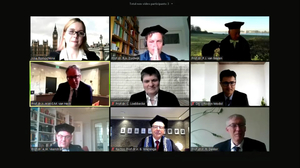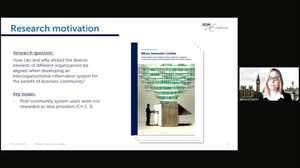Online PhD Defence Irina Romochkina

In her dissertation 'When interests collide: Understanding and modeling interests alignment using fair pricing in the context of interorganizational information systems’, Irina Romochkina claims that Inter-organizational information sharing is at the core of many modern business innovations; and accordingly inter-organizational information systems get to serve ever increasing number of different purposes. Irina Romochkina defended her dissertation online on Friday, 5 June 2020 at 11:30h. Her supervisors were Prof.dr. R.A. Zuidwijk and Prof.dr. P.J. van Baalen.
About Irina Romochkina

Irina Romochkina was born on October 13, 1987, in Yangiyul, the USSR. She completed her high school education in 2004 and graduated with excellence from Vladimir Commercial Lyceum. Irina continued her education at Lomonosov Moscow State University and received her Bachelor of Science in Economics degree with distinction in 2008. After the completion of her undergraduate studies, Irina worked as an intern for Volkswagen Group Rus. In 2009, Irina started the MPhil in Business Research program with a concentration in Logistics and Information Systems, offered by ERIM at Erasmus University Rotterdam. In 2011, she successfully received her Master of Science degree with appellation Cum Laude. The work on her master thesis inspired Irina to continue the academic track. During the same autumn, she joined the department of Decision and Information Sciences of Rotterdam School of Management as a Ph.D. Candidate.
Irina’s research focuses on logistics interorganizational information systems, specifically the interests that companies pursue when developing such systems and the different incentive alignment mechanisms being applied in this context. During her Ph.D. trajectory, Irina closely cooperated with practitioners by being a member of two research projects: NLI (National Logistics Infrastructure), funded by the Dutch government, and CASSANDRA (Common Assessment and Analysis of Risk in Global Supply Chains), funded by the European Union. The resulting work has been presented at various workshops and conferences, including the European Academy of Management Conference, the Institute for Operations Research and the Management Sciences Conference. Irina also has been involved as a teaching assistant for the following master's level courses: Global Logistics and Information Technology and Ports in Global Networks.
Thesis Abstract

As the business environment becomes increasingly disruptive, an important question arises: how do differences among decision makers affect a company’s ability to reimagine their disrupted business model? Addressing this question, this dissertation explores the nuances of the relationship between diversity (cognitive, ideological, socio-economic, and cultural) and organizational change processes (such as business model innovation, digital transformation, incubation of social enterprises, and evolution of a new industry). Ranging multiple contexts, including publishing and printing, legal-tech, and sustainable forest management, the four studies comprising this dissertation explore the following research questions. How does cognitive diversity influence the decision making and its implementation, particularly in the context of business model innovation? How does this contrast with the diversity of ideology? How do team structural characteristics (such as formal hierarchy, task dependence, co-dependent rewards, and team longevity) influence this relationship? What influence do team members who are social or professional outsiders have on the successful incubation of co-creative business models? And, what are the differences between insiders' and outsiders' perception of a firm's business model? For this purpose, the dissertation utilises various analyses techniques, including Computer Aided Text Analysis, Generalised Estimating Equations, Multiple Correspondence Analysis, K-means and hierarchical clustering, cognitive mapping and network analysis.


